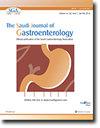The effectiveness of vedolizumab in advanced therapy-experienced ulcerative colitis patients: Real world data from the Inflammatory Bowel Disease of the Middle East (IBD-ME) Registry group.
IF 2
4区 医学
Q3 GASTROENTEROLOGY & HEPATOLOGY
引用次数: 0
Abstract
BACKGROUND Vedolizumab is an approved ulcerative colitis (UC) treatment. Multiple large randomized clinical trials have demonstrated the drug's efficacy and safety. However, real-world data from Middle Eastern countries are spare. The study aims to evaluate the clinical efficacy of vedolizumab (VDZ) therapy in advanced therapy experienced UC patients. METHODS A retrospective electronic chart review of a cohort study of 153 moderately to severely active UC patients who failed or were intolerant to TNF antagonists and received vedolizumab from two large tertiary care centers was performed. Rates of clinical response and remission were retrospectively evaluated at 3,6, and 12 months post VDZ therapy using Patient Simple Clinical Colitis Activity Index (P-SCCAI); clinical response was defined as a decrease in P-SCCAI ≥3, and clinical remission was defined as a P-SCCAI score of ≤3 points. Logistic regression analysis was used to identify predictors of response to vedolizumab. RESULTS A total of 153 UC patients had sufficient data for analysis. Clinical remission rates were 61.9% for patients on vedolizumab every 8 weeks and 89.3% for those receiving every 4 (Q4) weeks dosing. A significant reduction in CRP and improvement of albumin post vedolizumab treatment were observed, and corticosteroids were stopped in most patients. In a multiple logistic regression analysis, several factors were found to influence the clinical effectiveness of VDZ in inducing remission. Female gender was associated with a higher likelihood of remission [OR =3.09, 95% CI = (1.05-9.13), P = 0.04]. Conversely, a greater number of biologics used prior to VDZ treatment was associated with a lower likelihood of remission [OR =0.418, 95% CI = (0.203-0.859), P = 0.017]. Patients with extensive disease (E3) had an increased likelihood of remission [OR =3.81, 95% CI = (1.32-10.97), P = 0.0129]. Additionally, a VDZ dosing frequency of Q4 weeks was associated with a significantly higher likelihood of remission [OR =6.08, 95% CI = (1.73-21.39), P = 0.0049]. No significant safety signals were reported. CONCLUSIONS In this current real-world study, vedolizumab effectively achieved clinical response and remission in most advanced therapy experienced UC patients treated for up to 12 months. Future studies with larger sample sizes and more robust study designs should be conducted to further validate the results of this study.维多珠单抗对有晚期治疗经验的溃疡性结肠炎患者的疗效:来自中东炎症性肠病(IBD-ME)注册小组的真实数据。
背景韦多珠单抗是一种已获批准的溃疡性结肠炎(UC)治疗药物。多项大型随机临床试验证明了该药物的疗效和安全性。然而,来自中东国家的实际数据却十分匮乏。该研究旨在评估韦多珠单抗(VDZ)治疗晚期有治疗经验的 UC 患者的临床疗效。方法对两家大型三级医疗中心的 153 名 TNF 拮抗剂治疗失败或不耐受、接受韦多珠单抗治疗的中重度活动性 UC 患者的队列研究进行了回顾性电子病历审查。使用患者简易临床结肠炎活动指数(P-SCCAI)对VDZ治疗后3、6和12个月的临床反应和缓解率进行了回顾性评估;临床反应的定义是P-SCCAI下降≥3分,临床缓解的定义是P-SCCAI得分≤3分。结果共有153名UC患者的数据可用于分析。每8周服用一次维多珠单抗的患者临床缓解率为61.9%,每4周服用一次(Q4)的患者临床缓解率为89.3%。接受维多珠单抗治疗后,CRP明显降低,白蛋白有所改善,大多数患者停用了皮质类固醇。多重逻辑回归分析发现,有几个因素会影响维多珠单抗在诱导病情缓解方面的临床疗效。女性与缓解的可能性较高有关[OR =3.09,95% CI = (1.05-9.13),P = 0.04]。相反,VDZ治疗前使用生物制剂的次数越多,缓解的可能性越低[OR =0.418,95% CI = (0.203-0.859),P = 0.017]。病情广泛(E3)的患者缓解的可能性增加[OR =3.81,95% CI = (1.32-10.97),P = 0.0129]。此外,VDZ给药频率为Q4周与缓解可能性显著增加相关[OR =6.08,95% CI = (1.73-21.39),P = 0.0049]。结论 在目前这项真实世界研究中,维多珠单抗能有效实现大多数晚期治疗UC患者的临床应答和缓解,治疗时间长达12个月。未来应开展样本量更大、研究设计更合理的研究,以进一步验证本研究的结果。
本文章由计算机程序翻译,如有差异,请以英文原文为准。
求助全文
约1分钟内获得全文
求助全文
来源期刊

Saudi Journal of Gastroenterology
GASTROENTEROLOGY & HEPATOLOGY-
CiteScore
4.40
自引率
3.70%
发文量
63
审稿时长
28 weeks
期刊介绍:
The Saudi Journal of Gastroenterology (SJG) is an open access peer-reviewed publication. Authors are invited to submit articles in the field of gastroenterology, hepatology and nutrition, with a wide spectrum of coverage including basic science, epidemiology, diagnostics, therapeutics, public health, and standards of health care in relation to the concerned specialty. Review articles are usually by invitation. However review articles of current interest and a high standard of scientific value could also be considered for publication.
 求助内容:
求助内容: 应助结果提醒方式:
应助结果提醒方式:


